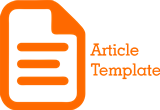Paradigma Bahagia Itu Mencerdaskan Ikhtiar Membangun Kemerdekaan Belajar Anak Usia Dini
Abstract
Paradigma Bahagia Itu Mencerdaskan bertalian erat dengan program Merdeka Belajar. Penelitian ini bertujuan untuk mengevaluasi penerapan paradigma Bahagia Itu Mencerdaskan dalam kaitannya dengan membangun kemerdekaan belajar anak usia dini. Penelitian ini menggunakan metode evaluasi, dengan model Input-Proses-Output-Outcome (IPOO). Hasil penelitian menunjukkan bahwa paradigma Bahagia Itu Mencerdaskan merupakan langkah baru dalam memahami esensi belajar yang sesungguhnya. Peserta didik hanya bisa belajar dengan baik bilamana dalam suasana hati, iklim belajar dan dukungan lingkungan yang membahagiakan. Dengan belajar dalam situasi bahagia maka akan berdampak pada kecerdasan peserta didik, baik kecerdasan kognitif, afektif maupun psikomotoriknya.
Keywords
Full Text:
PDFReferences
Daftar Pustaka
Akmal, Yenina, dkk., 2018. Preparing for Parenthood; Parenting Training Module on six Child Development Aspect in East Jakarta, Jurnal Pendidikan Usia Dini, http://journal.unj.ac.id/unj/index.php/jpud. Volume 12 Edisi 2 November 2018. DOI: https://doi.org/10.21009/JPUD.132.12
Beattie, A. Elizabeth, 2015. A Young Child's Perspectives on Outdoor Play: A Case Study from Vancouver, British Columbia, International Journal of Early Childhood Environmental Education, ISSN 2331-0464 (online) Volume 3, Number 1 Winter 2015.
Carl R. Rogers. Freedom to Learn. Columbus, Ohio: Charles E. Merril. Publishing Company
Cooper, Allen, 2017. Nature and the Outdoor Learning Environment: The Forgotten Resource in Early Childhood Education, International Journal of Early Childhood Environmental Education, ISSN 2331-0464 (online) Volume 1, Number 3, Spring 2017.
Duckworth, A. L. & Seligman, M. E. P (2006). Self-Discipline Gives Girls the Edge: Gender in Self-Discipline, Grades, And Achievement Tes Score. Journal of Educational Psychology. 98(1): 198-208
Gardner, Howard. 1993. Multiple Intelligences. The Theory In Practice. New. York: Basic Books.
Badan Pusat Statistik (2020) Provinsi DKI Jakarta dalam angka 2019 https://jakarta.bps.go.id/publication/2019/08/16/eea4f4b387c3024bb4a3a7fc/provinsi-dki-jakarta-dalam-angka-2019.html. Diakses, 16 April 2020, Pukul 13.40 WIB.
Ismaniar, 2018. Model Permainan Estafet Bait Lagu untuk Meningkatkan Kemampuan Pemusatan Perhatian pada Anak, Jurnal Pendidikan Usia Dini, Volume 12 Edisi 1, April 2018, E-ISSN:2503-0566, DOI: https://doi.org/10.21009/JPUD.121
King, R. B., & Datu, J. A. (2017). Happy classes make happy students: Classmates' well-being predicts individual student well-being. Journal of School Psychology, 65, 116-128.
Liu, W., Tian, L., Huebner, E. S., Zheng, X., & Li, Z. (2015). Preliminary development of the elementary school students' subjective well-being in school scale. Social Indicators Research, 120(3), 917-937.
Martin, C. and Powell, P. 1992, Information Systems: A Management Perspective, London, McGraw-Hill.
Nurani, Y., Trias M., 2017. Pengembangan Model Kegiatan Sentra Bermain dalam Mengembangkan Kreativitas Anak Usia Dini, Jurnal Pendidikan Usia Dini. DOI: https://doi.org/10.21009/JPUD.112
Puspita Adhi Kusuma Wijayanti, Rezki Ashriyana Sulistiobudi, 2018. Peer Relation Sebagai Prediktor Utama School Well-Being Siswa Sekolah Dasar, Jurnal Psikologi Vol.17 No.1 April 2018, https://www.researchgate.net/_publication/325624245
Rahardjo, Maria M., 2019. How to use Loose-Parts in STEAM? Early Childhood Educators Focus Group discussion in Indonesia, Jurnal Pendidikan Usia Dini, http://journal.unj.ac.id/unj/index.php/jpud, Volume 13 Edisi 2 November 2019, DOI: https://doi.org/10.21009/JPUD.132.08
Rogers, Everett (2003). Diffusion of Innovations, 5th Edition. Simon and Schuste
Susanne A. Denham, Hideko H. Bassett & Katherine Zinsser, 2018. Early Childhood Teachers as Socializers of Young Children's Emotional Competence, Early Childhood Education Journal, ISSN 1082-3301, Springer, Early Childhood Educ. J, DOI: https://10.1007/s10643-012-0504-2
Suwahono, Dwi Mawanti, 2019. Using Environmentally Friendly Media (Happy Body) in Early Childhood Science: Human Body Parts Lesson, Jurnal Pendidikan Usia Dini, http://journal.unj.ac.id/unj/index.php/jpud, Volume 13 Edisi 2 November 2019, DOI: https://doi.org/10.21009/JPUD.132.06.
Syslová, Zora, 2020. Correction to: The relation between reflection and the quality of a preschool teacher's education performance, International Journal of Child Care and Education Policy, Correction to: Int J Child Care Educ. Policy (2019) 13:4, DOI: https://doi.org/10.1186/s40723-019-0060-y
Teo, Betty, 2020. Early Childhood Educational Management: Managing change in curriculum in early childhood education canters in Singapore to allow for play curriculum, International Journal of Child Care and Education Policy, Correction to: Int J Child Care Educ. Policy (2019) 18:2. DOI: https://doi.org/ 10.1186/s40723-019-0060-y
Unesco (2016) Happy Schools, ISBN: 978-92-9223-542-0 (Electronic Version) UNESCO Open Access Repository (http://www.unesco.org/open-access/terms- use-ccbysa-en).
DOI: http://dx.doi.org/10.37905/aksara.6.3.265-276.2020
Refbacks
- There are currently no refbacks.
Copyright (c) 2020 Aksara: Jurnal Ilmu Pendidikan Nonformal

This work is licensed under a Creative Commons Attribution-ShareAlike 4.0 International License.
Publisher:
Magister Pendidikan Nonformal Pascasarjana Universitas Negeri Gorontalo
Jl. Soedirman No. 06 Gorontalo 96128 e-mail: jurnalaksara@ung.ac.id
http://ejurnal.pps.ung.ac.id







